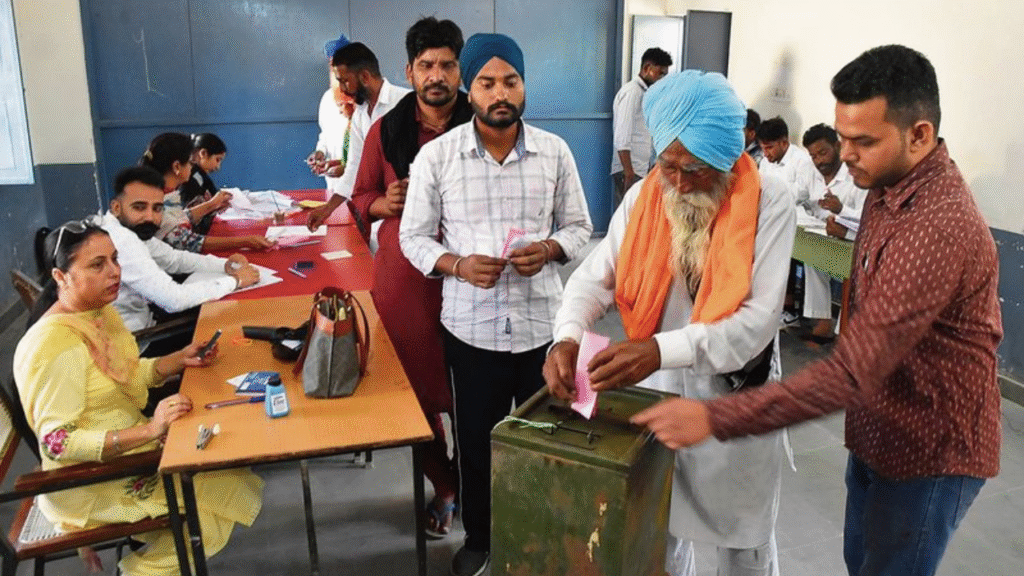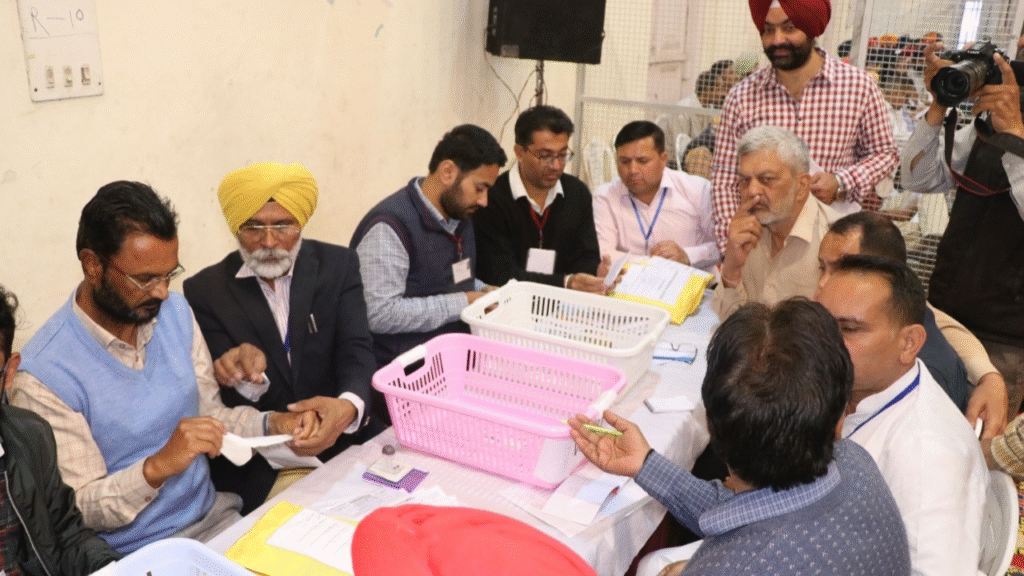📌 Introduction
The upcoming 2025 Punjab Assembly Elections mark a critical juncture in the state’s political trajectory. Following Aam Aadmi Party’s (AAP) historic 2022 sweep, Punjab’s political battlefield is preparing for a high-stakes contest that could redefine regional politics, reshape traditional alliances, and test the electorate’s patience with governance and promises.
This detailed analysis explores the expected key dates, emerging alliances, shifting voter base dynamics, likely battleground constituencies, and the impact of national politics on this northern state’s regional contest.
⏳ Section 1: Expected Timeline of the 2025 Punjab Elections
Though exact dates will be declared by the Election Commission of India closer to the polls, based on precedent, here is a tentative election timeline:
| Activity/Event | Likely Date (2025) |
|---|---|
| Election Notification Issued | January 10 – 15 |
| Last Date for Filing Nominations | January 20 – 25 |
| Scrutiny of Nominations | January 26 – 28 |
| Withdrawal of Candidature Deadline | January 29 – 30 |
| Polling Date | February 10 – 15 |
| Result Declaration | March 1 – 5 |
| New Government Formation Deadline | March 15 – 20 |
The elections are expected to take place in a single phase, as done previously, across all 117 constituencies.
🧩 Section 2: Major Political Players & Emerging Alliances
🟡 Aam Aadmi Party (AAP)
- Leader: Bhagwant Mann
- Seats Held (2022): 92/117
- Strategy: Defend incumbency with performance-based messaging on healthcare, education, and electricity.
🔵 Indian National Congress (INC)
- Leader(s): Navjot Singh Sidhu, Raja Warring, and potential new faces
- Seats Held (2022): 18
- Focus: Regain lost Dalit and rural vote banks, unite warring factions
🟤 Shiromani Akali Dal (SAD)
- Leader: Sukhbir Singh Badal
- Seats Held (2022): 3
- Alliance Talks: Potential coalition with BJP or smaller Sikh groups
🟠 Bharatiya Janata Party (BJP)
- Leader: Ashwani Sharma (State President)
- Strategy: Grow independent footprint post break-up with SAD; tap into urban Hindu vote base
🟢 New Entrants & Regional Forces
- Possible splinter groups or Sikh-centric political outfits
- Former MLAs forming independent alliances
- Farmers’ union-backed candidates eyeing rural constituencies

🤝 Section 3: Potential Alliances & Coalition Scenarios
| Alliance Type | Potential Partners | Strategic Value |
|---|---|---|
| AAP (solo) | AAP alone | Continuity, tested voter base |
| INC + Farmer Leaders | Congress + Kisan Unions | Rural votes, anti-incumbency |
| SAD + BJP (reunion) | SAD re-aligning with BJP | Religious + Urban Hindu base |
| Third Front Possibility | New regional parties | Vote split among big players |
The Congress-Farmer Alliance, if formed, could challenge AAP in agrarian regions. A SAD-BJP reunion, though uncertain, would be significant in Malwa and Doaba.
📍 Section 4: Key Battleground Constituencies to Watch
| Constituency | District | Why It’s Important | 2022 Winner |
|---|---|---|---|
| Dhuri | Sangrur | CM Bhagwant Mann’s stronghold | AAP |
| Amritsar East | Amritsar | Ex-Congress president Navjot Sidhu’s turf | AAP |
| Lambi | Muktsar | Traditional SAD bastion | AAP |
| Patiala Urban | Patiala | Royal family base, Congress legacy seat | AAP |
| Jalalabad | Fazilka | Sukhbir Badal’s home turf | AAP |
| Batala | Gurdaspur | Congress stronghold; intense youth campaign | Congress |
These seats will serve as symbolic and strategic benchmarks for voter sentiment across regions.

📊 Section 5: Voter Demographics and Trends
Punjab’s diverse demographic landscape will heavily influence the election outcome. Here’s a breakdown:
| Demographic Segment | Approx % | Past Voting Pattern | 2025 Trend Outlook |
|---|---|---|---|
| Dalits | 32% | Congress leaning | Up for grabs (AAP making inroads) |
| Sikh Farmers | 35% | SAD/Congress | Split between AAP and INC |
| Urban Middle Class | 18% | BJP/AAP | Leaning AAP/BJP |
| Youth (18–35 yrs) | 42% | Mixed | Key swing group |
| Women Voters | 48% | Increasing turnout | Influenced by welfare issues |
Women and young voters could prove to be the kingmakers, especially with digital outreach and employment initiatives playing a role.
📣 Section 6: Election Issues Likely to Dominate the Narrative
📌 1. Drug Menace and Youth Unemployment
Despite efforts, the drug abuse crisis remains a major public concern. With a large youth base, employment generation and vocational training will be critical issues.
📌 2. Agriculture and Farmer Welfare
Post the 2020–21 farmers’ protest, agricultural distress continues. Loan waivers, MSP assurances, and mandi reforms are hot topics.
📌 3. Education and Health Infrastructure
AAP’s Delhi model set expectations high in Punjab. The delivery vs. promise gap in Mohalla Clinics and school overhauls will be scrutinized.
📌 4. Corruption and Governance
Every party will claim the moral high ground. Allegations of corruption, especially in sand mining and recruitment, will be key mudslinging themes.
📆 Section 7: Campaign Styles and Election Machinery
AAP:
- Door-to-door outreach
- Social media influencer-based engagement
- “Report card” on performance
Congress:
- Mass rallies
- Appeal to emotion and legacy
- Possible use of Gandhi family campaigns
SAD:
- Gurdwara connect
- Traditional Jat Sikh vote consolidation
BJP:
- Focus on Hindu-majority towns
- National leadership-led blitzkrieg campaigns
🧮 Comparative Party Analysis Table
| Party | 2022 Seats | Incumbency Status | Main Agenda | Weakness |
|---|---|---|---|---|
| AAP | 92 | Incumbent | Education, Health, Clean Governance | Delivery gaps, debt |
| Congress | 18 | Opposition | Farmer, Dalit rights, anti-AAP | Factionalism |
| SAD | 3 | Marginalized | Sikh identity, traditional issues | Loss of credibility |
| BJP | 2 (approx) | Rising | Development, national issues | Weak rural roots |
🔚 Conclusion
The 2025 Punjab Elections are not just another political contest; they represent a battle between old loyalties and new aspirations. AAP will be judged on performance, while Congress and SAD will be tested on reinvention. The BJP, although limited regionally, will look to leverage national momentum.
With high stakes, emerging voter sophistication, and the backdrop of national political polarization, Punjab may again script an unexpected political chapter in India’s democracy.
